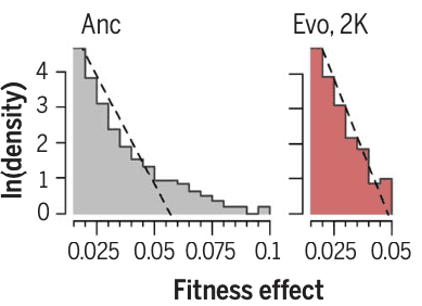The latest issue of Science magazine has a long-format research article on the bacterial populations in an experiment started in 1988 by EEB core faculty member Richard Lenski.

With a team of researchers from Spain, France, and Harvard, Lenski and colleagues used high-throughput genomic methods to analyze the fitness effects of hundreds of thousands of mutations in the E. coli bacteria, and how those effects changed over time as the experiment proceeded.
Latest conclusion: Evolution is predictable.
See an interview with collaborator Spanish biologist Alejandro Couce story in the Spanish newspaper El País.
“You might think that evolution would run out of steam after 50,000 generations in a simple, constant environment,” Lenski said. “But we’ve shown previously (*Wiser et al., Science, 2013) that it doesn’t. In this paper, we shed light on how evolution is so endlessly creative, even in a static world—as beneficial changes occur, they open up new opportunities for exploration and improvement.” over time, and that the identity of the genes that harbor potential beneficial mutations also changed. Moreover, the identity of essential genes—those required for the cells to survive and reproduce—changed over time, often in repeatable ways across the independently evolving lineages.
You can read the paper in Science: Changing fitness effects of mutations through long-term bacterial evolution
 Also, Lenski tells a backstory to the paper that “sheds light on how civility, cooperation, and collaboration can succeed even in the highly competitive world of science” in An Update to the Changing Distribution of Fitness Effects.
Also, Lenski tells a backstory to the paper that “sheds light on how civility, cooperation, and collaboration can succeed even in the highly competitive world of science” in An Update to the Changing Distribution of Fitness Effects.
“Like many of the papers about the long-term evolution experiment, this was a collaboration with scientists from other universities and around the world,” Lenski said. “And it required a very unusual and special kind of collaboration because the paper actually represents a fusion of what started as two separate papers—what could have become a tense competition instead became a fun cooperation.”
This story was originally posted by College of Natural Science
About the MSU Innovation Center:
The MSU Innovation Center is dedicated to fostering innovation, research commercialization, and entrepreneurial activities from the research and discovery happening across our campus every day. We act as the primary interface for researchers aiming to see their research applied to solving real-world problems and making the world a better place to live. We aim to empower faculty, researchers, and students within our community of scholars by providing them with the knowledge, skills, and opportunities to bring their discoveries to the forefront. Through strategic collaborations with the private sector, we aim to amplify the impact of faculty research and drive economic growth while positively impacting society. We foster mutually beneficial, long-term relationships with the private sector through corporate-sponsored research collaborations, technology licensing discussions, and support for faculty entrepreneurs to support the establishment of startup companies.
Is your company interested in working with MSU’s team of researchers? Click Here.
